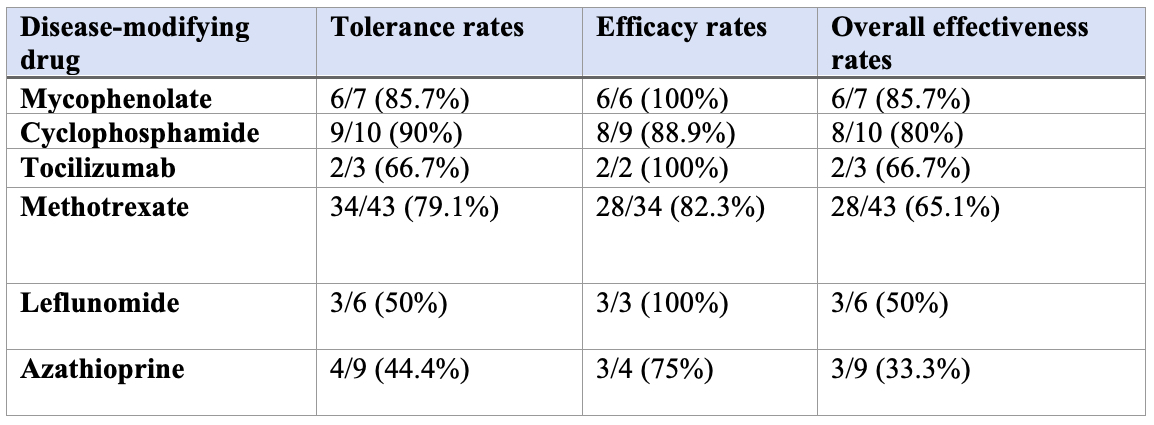Session Information
Date: Monday, November 18, 2024
Title: Vasculitis – Non-ANCA-Associated & Related Disorders Poster III
Session Type: Poster Session C
Session Time: 10:30AM-12:30PM
Background/Purpose: Non-infectious Aortitis is a rare form of large vessel vasculitis which has a high risk of complications1. There is limited data on the management of non-infectious aortitis and no studies reporting efficacy of disease-modifying drugs (DMARDs). The primary objective of this study was to investigate the effectiveness of DMARDs in non-infectious aortitis.
Methods: We retrospectively reviewed patients diagnosed with non-infectious aortitis at Oxford University Hospitals NHS Foundation Trust, UK, from 2010 to 2020. This project as approved as an audit locally. Medical details were collated from electronic patient records and analysed. The study included DMARDs such as Methotrexate, Cyclophosphamide, Leflunomide, Azathioprine, Mycophenolate and Tocilizumab. Extensive aortitis was defined by PET-CT diagnosis involving more than one aortic region. Drug efficacy was assessed by the percentage of patients subsequently achieving long term remission off treatment (LTROT). Data analysis was performed using R version 4.2.2.
Results: Between 2010-2020 110 adults were diagnosed with non-infectious Aortitis, with 59% being female and a median age of 77 (±9.71) years. Twelve patients were excluded due to care transfer. Of the 98 remaining, 44 (44.9%) achieved long-term remission after a median treatment of 48 months (IQR=30.8-75.3, range 3-144), using a median of one DMARD (IQR=1-2, range 1-6) and 24 months of corticosteroids (IQR=12-48, range 0-72). The median age at time of diagnosis in LTROT patients was 71.66 years (IQR=65.7-78.8, range 52.3-89.5), with 95.5% having extensive aortitis and 90.1% being White-British. The median remission duration was 51.5 months (IQR=30.8-62.5, range 7-99). No patients developed secondary adrenal insufficiency from corticosteroids. Methotrexate monotherapy led to remission in 25 patients (56.8%), with 43 (97.8%) patients using methotrexate. Mycophenolate showed 100% efficacy in the 6 patients who tolerated it and 85.7% tolerance – one patient had nausea. Azathioprine had the lowest effectiveness, with 33.3% achieving remission. Discontinuation reasons included inefficacy (11.1%), gastrointestinal intolerance (22.2%), and abnormal liver function (33.3%). Tocilizumab achieved 100% remission in patients who tolerated it (66.7%), with one discontinuation due to neutropenia. Table 1 details the tolerance, efficacy, and effectiveness rates of all DMARDs.
Conclusion: Patients with non-infectious Aortitis reaching LTROT were on treatment with DMARDs for around 4 years. DMARDs appear to be more effective for this than cranial GCA based on this preliminary data, Leflunomide and Mycophenolate are worthy of further investigation for this condition. No patients required long-term hydrocortisone for secondary adrenal insufficiency.
References:
Ahmad N, Andev R, Verdiyeva A, Dubey S. Single centre experience of 120 patients with non-infectious aortitis: clinical features, treatment and complications. Autoimmunity Reviews 2023 Jul;22(7):103354. doi: 10.1016/j.autrev.2023.103354.
To cite this abstract in AMA style:
Vijjhalwar R, Ketheeswaranathan V, More A, Andev R, Dubey S. Long-term Remission off Therapy (LTROT) Is Possible in Non-infectious Aortitis with DMARDs with Low Risk of Secondary Adrenal Insufficiency [abstract]. Arthritis Rheumatol. 2024; 76 (suppl 9). https://acrabstracts.org/abstract/long-term-remission-off-therapy-ltrot-is-possible-in-non-infectious-aortitis-with-dmards-with-low-risk-of-secondary-adrenal-insufficiency/. Accessed .« Back to ACR Convergence 2024
ACR Meeting Abstracts - https://acrabstracts.org/abstract/long-term-remission-off-therapy-ltrot-is-possible-in-non-infectious-aortitis-with-dmards-with-low-risk-of-secondary-adrenal-insufficiency/

